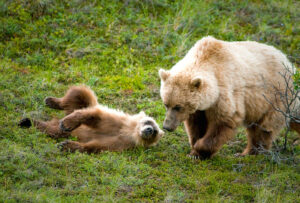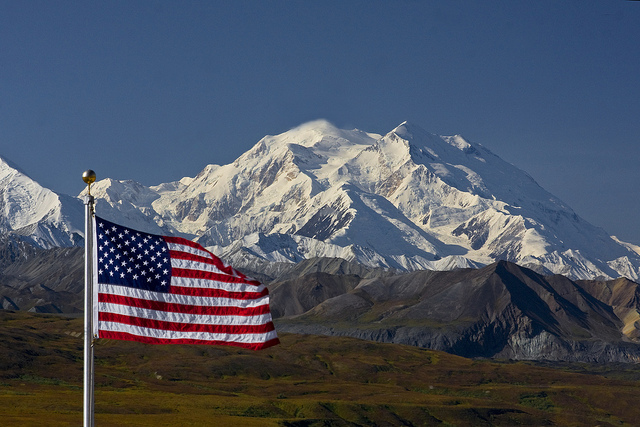
America’s Best Idea, the National Parks, Turns 100
Staff Attorney Katie Strong shares why national parks are important to her as the nation celebrates the National Park System’s centennial on August 25, 2016.
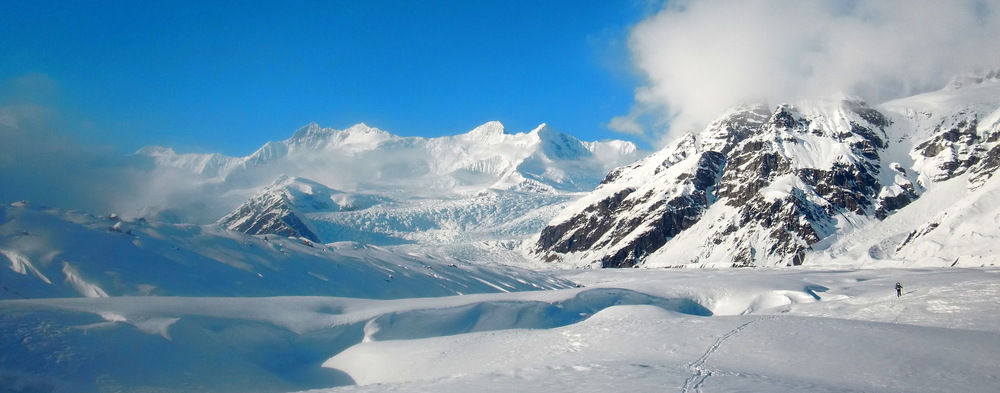
Katie Strong skiing through Wrangell-St. Elias National Park in the winter of 2015. The beauty and quiet she encountered are two reasons national parks are so special to her. Photo courtesy of Scott Peters.
Skiing through the Gates of the Arctic and the Wrangell-St. Elias. Climbing high above the floor of Yosemite Valley. Running across the Grand Canyon. Watching wolves and bison in the Lamar Valley of Yellowstone. Watching a coyote howl at sunrise in Joshua Tree. Experiencing the solitude of a solo backpack on Isle Royale. When I try to catalog my trips in the National Parks, much less capture what they’ve meant to me, my head quickly fills with memories of spectacular places and life-defining moments.
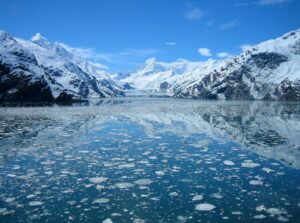
Johns Hopkins Glacier on a dramatically sunny day in Glacier Bay National Park and Preserve. NPS Photo.
I’m not alone in my love of the parks. Wallace Stegner called them “the best idea [Americans] ever had.” Theodore Roosevelt likened camping in Yellowstone to “lying in a great solemn cathedral, far vaster and more beautiful than any built by the hand of man.” And just this week, President Obama remarked on the beautiful places protected within the park system, encouraging us all to get out and enjoy them.
And of these remarkable landscapes, Alaska has some of the most spectacular. Visitors come from all over the world to see Denali, watch bears in Katmai, and float through Glacier Bay. Alaskans are rich simply from being near to these — as President Obama calls them — sacred places. But they also contribute significantly to our economy. The Park Service calculates the economic benefit from tourism related to the parks in Alaska at almost $1.2 trillion.
That staggering number aside, the parks are simply irreplaceable and their value immeasurable. As George Write and others noted in their 1933 article Fauna of the National Parks of the United States: “[O]ur greatest national heritage is nature itself, with all its complexity and abundance of life, when combined with great scenic beauty as it is in the national parks, becomes of unlimited value.”
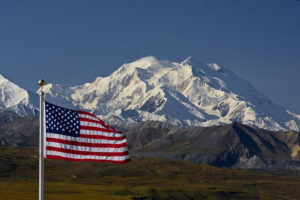
The National Parks are America’s best idea. The iconic Denali with our flag. NPS photo by Ken Conger.
One hundred years ago today, America committed to its “best idea” by creating the National Park System. That idea has endured, and the parks system has made the country and the world a richer place.
At Trustees, we’re continually on the look-out for proposals that would impair Alaska’s national parks, and work diligently to protect those special places.
Some of our work protecting national parks includes:
Navigable Waters
Trustees defended the National Park Service’s authority over navigable waters within its boundaries in two unrelated incidents and legal cases, Wilde and Sturgeon. The National Park Service won the Sturgeon case at the district court and at the U.S. Court of Appeals, both courts upholding its authority to regulate hovercraft within Yukon-Charley Rivers National Preserve. Sturgeon appealed to the U.S. Supreme Court, which vacated the reasoning relied on in the appeal court’s decision. The Ninth Circuit will rehear the case this October. The ultimate outcome of this case will significantly affect the Park Service’s ability to protect Alaska’s national parks, and the fish and wildlife that rely on them.
Predator Control
The National Park Service adopted new sport hunting regulations for national preserves that protect predators from extreme practices allowed by the Alaska State Board of Game. The new rules ban aggressive predator control like bear baiting, snaring, and spotlighting in dens. They also ban killing bear cubs or sows with cubs, wolves or coyotes during denning season, and swimming big game. Trustees for Alaska advocated for the stricter rules on behalf of ten conservation groups.
Snow Machining in Denali National Park
Trustees intervened when a group of snow machining interests sued the Park Service to open the original park, now designated Wilderness, to recreational snow machining. The Park Service ultimately issued rules closing “Old Denali” to all snow machining.
ORV Use in Wrangell-St. Elias
Trustees challenged the Park Service for illegal off-road vehicle (“ORV”) use on nine trails within Wrangell-St. Elias National Park and Preserve. The lawsuit was settled out of court with stipulations that the Park would study the impacts of ORVs and to follow its own rules in managing recreational, non-subsistence off-road vehicle use in the Park.
Unauthorized Roadbuilding in Wrangell-St. Elias
In Spring of 2002, members of the Hale family bulldozed a road to their home near McCarthy across approximately 14 miles of Wrangell-St. Elias National Park without informing the Park Service or obtaining the necessary permission. What followed was a protracted legal battle. Trustees intervened in the lawsuit supporting the Wrangell-St. Elias to ensure the Park Service continues to have the authority to protect park resources. The case finally ended when the US Supreme Court denied a petition submitted by the Hales.
Snow Machining in Wrangell-St. Elias
Wrangell-St. Elias, is considering allowing recreational snow machining in the park, including Wilderness under their proposed backcountry management plan. Trustees sent in comments reminding the Park that ANILCA does not include recreational snow machine use in parks.



